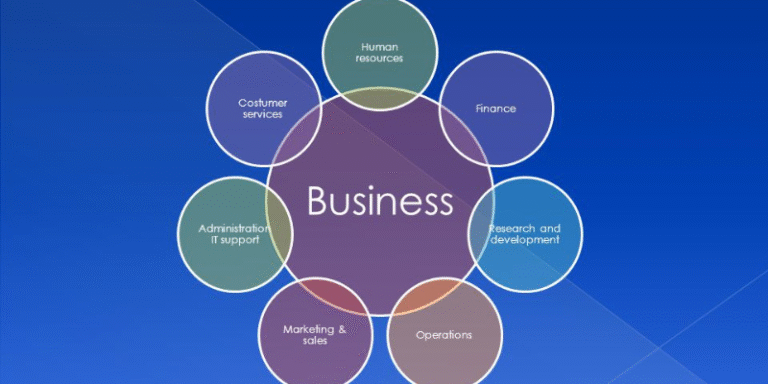In every organisation, the core functions of marketing, finance, human resource management (HRM), and operations form the structural pillars that drive performance, productivity, and long-term sustainability. While each function has distinct responsibilities, their interdependence is vital to fulfilling the strategic objectives and mission of the organisation. A holistic understanding of organisational functions—and how they interact—provides crucial insight into modern business dynamics.
1.0 The Role of Marketing
Marketing is the function dedicated to identifying and satisfying customer needs in a competitive environment. It encompasses a range of activities such as market research, product development, pricing, promotion, and distribution (Kotler & Keller, 2016). As the interface between the organisation and the external market, marketing shapes both perception and demand.
Beyond promotional tactics, marketing plays a strategic role. It involves market segmentation, targeting, and positioning (STP), which ensures that the organisation effectively communicates its value proposition. According to Moorman and Rust (1999), marketing contributes to financial performance by enhancing customer equity and loyalty. Marketing insights also guide product innovation and brand management, helping firms remain competitive in rapidly evolving markets.
Strategically, marketing must be aligned with organisational goals. For example, in sustainable organisations, marketing communicates environmental responsibility and ethical values, directly influencing brand reputation (Gronroos, 1990). As such, the marketing department does not operate in isolation—it informs and is informed by finance, operations, and HRM.
2.0 The Role of Finance
The finance function is the engine room of resource allocation within an organisation. It involves budgeting, financial planning, cost control, risk management, and investment appraisal (Atrill & McLaney, 2019). Effective financial management ensures that the organisation maintains liquidity, solvency, and profitability.
Finance plays a vital strategic role. It supports long-term planning, evaluates return on investment (ROI), and informs decisions such as expansion, mergers, or product launches. According to O’Higgins and Kelleher (2005), financial managers must also balance ethical responsibility with profit motives, particularly in stakeholder-sensitive industries.
Furthermore, finance underpins other organisational functions. For instance, marketing campaigns require budget approval, operations depend on capital investment for machinery or technology upgrades, and HRM relies on financial input for remuneration and training schemes. When these functions are misaligned with finance, the result can be inefficiencies, budget overruns, or even strategic failure (Lin et al., 2016).
3.0 The Role of Human Resource Management (HRM)
HRM manages the organisation’s most valuable asset—its people. It encompasses recruitment, training, performance management, employee relations, compensation, and health and safety (Armstrong & Taylor, 2020). HRM ensures that the workforce is not only capable but also motivated and aligned with the organisation’s values.
Modern HRM is deeply strategic, contributing to organisational change, leadership development, and organisational culture. As noted by Jackson and Schuler (1995), HRM practices must align with external environmental forces and internal goals. This includes developing employee competencies that match the demands of marketing, finance, and operations.
Moreover, strategic HRM has been shown to positively impact financial performance when aligned with organisational objectives (Youndt et al., 1996). HRM also plays a central role in compliance with employment law and in upholding corporate social responsibility (CSR), which in turn supports the ethical foundations of marketing and finance (Guest, 1987).
4.0 The Role of Operations
Operations management concerns the efficient and effective delivery of products and services. It involves process design, quality management, capacity planning, inventory control, and supply chain coordination (Slack et al., 2019). The operations function transforms inputs—materials, labour, and capital—into outputs of value.
In a competitive landscape, operations directly influence customer satisfaction, cost structures, and innovation. For instance, lean operations can reduce waste and improve efficiency, while quality assurance ensures products meet customer expectations. According to Snell and Dean (1992), operations are increasingly integrated with HRM and technology to drive performance.
Operations also rely heavily on other functions. Marketing forecasts demand, finance allocates operational budgets, and HRM provides skilled labour. Cross-functional collaboration is thus essential to synchronise production with market demand and financial capability.
Interrelationships and Organisational Alignment
While each function plays a distinct role, their interrelationship defines the success or failure of organisational strategies. An organisation where departments operate in silos risks duplication of effort, communication breakdowns, and strategic misalignment (Ruekert & Walker, 1987).
For instance, consider the launch of a new product. Marketing must assess customer demand and propose a pricing strategy. Finance must evaluate the projected ROI. HRM must ensure skilled personnel are available, while operations must schedule production efficiently. Only when all departments are synchronised can the product be launched successfully and profitably.
A study by Harris and Ogbonna (2001) emphasises the importance of market orientation, which involves aligning all business functions toward customer satisfaction. This alignment requires internal communication, leadership, and shared strategic vision.
Moreover, organisational culture and values influence functional integration. If sustainability is a core value, operations must implement green processes, finance must invest in sustainable technologies, marketing must communicate environmental efforts, and HRM must train employees in ethical practices (Bratton et al., 2021).
In large organisations, integration is often facilitated through enterprise resource planning (ERP) systems and cross-functional teams, which ensure real-time data sharing and coordinated decision-making.
The functions of marketing, finance, human resource management, and operations are indispensable in any organisation. While each serves a unique purpose, their synergy ensures strategic alignment, operational efficiency, and long-term sustainability. The interdependencies among these functions demand ongoing communication, collaboration, and shared purpose. Organisations that achieve this alignment are more likely to succeed in volatile and competitive environments.
References
Armstrong, M. & Taylor, S. (2020) Armstrong’s Handbook of Human Resource Management Practice. London: Kogan Page.
Atrill, P. & McLaney, E. (2019) Accounting and Finance for Non-Specialists. 11th ed. Harlow: Pearson Education.
Bratton, J., Gold, J. & Steele, L. (2021) Human Resource Management: Theory and Practice. London: Red Globe Press.
Guest, D.E. (1987) ‘Human resource management and industrial relations’, Journal of Management Studies, 24(5), pp. 503–521.
Gronroos, C. (1990) ‘Relationship approach to marketing in service contexts’, Journal of Business Research, 20(1), pp. 3–11.
Harris, L.C. & Ogbonna, E. (2001) ‘Strategic human resource management, market orientation and organisational performance’, Journal of Business Research, 51(2), pp. 157–166.
Jackson, S.E. & Schuler, R.S. (1995) ‘Understanding human resource management in the context of organizations and their environments’, Annual Review of Psychology, 46, pp. 237–264.
Kotler, P. & Keller, K.L. (2016) Marketing Management. 15th ed. Harlow: Pearson Education.
Lin, C.H. et al. (2016) ‘From customer-oriented strategy to organisational financial performance’, British Journal of Management, 27(1), pp. 77–95.
Moorman, C. & Rust, R.T. (1999) ‘The role of marketing’, Journal of Marketing, 63(4), pp. 180–197.
O’Higgins, E. & Kelleher, B. (2005) ‘Ethical orientations of functional managers’, Journal of Business Ethics, 57(1), pp. 79–90.
Ruekert, R.W. & Walker, O.C. Jr. (1987) ‘Marketing’s interaction with other functional units’, Journal of Marketing, 51(1), pp. 1–19.
Slack, N., Brandon-Jones, A. & Johnston, R. (2019) Operations Management. 9th ed. Harlow: Pearson Education.
Snell, S.A. & Dean, J.W. Jr. (1992) ‘Integrated manufacturing and human resource management’, Academy of Management Journal, 35(3), pp. 467–504.
Youndt, M.A., Snell, S.A., Dean, J.W. Jr. & Lepak, D.P. (1996) ‘Human resource management, manufacturing strategy, and firm performance’, Academy of Management Journal, 39(4), pp. 836–866.









